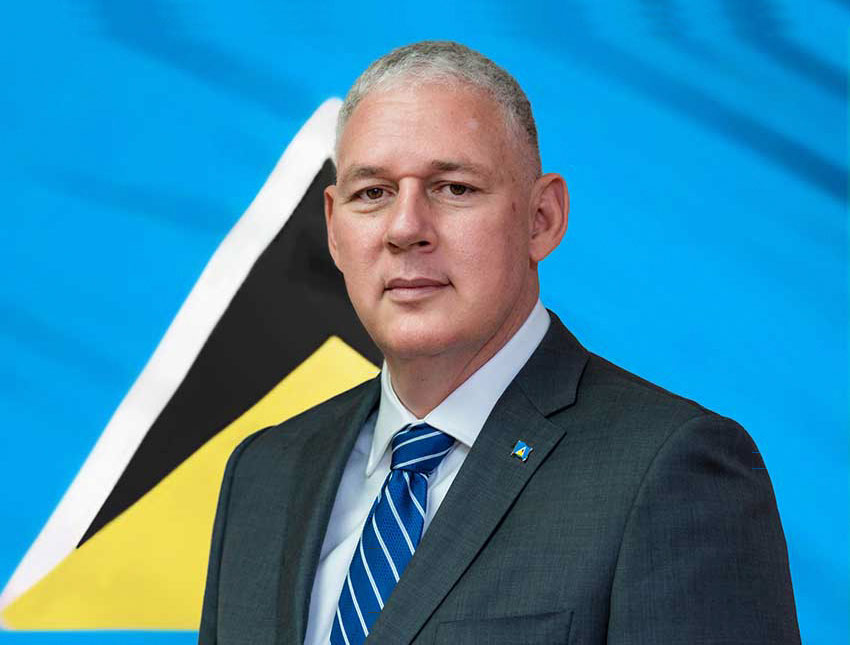PRIME Minister Allen Chastanet says he supports the idea of the Citizen by Investment Programme (CIP) being run out of the Organization of Eastern Caribbean States (OECS).
Chastanet told reporters Tuesday that the Programme is at the OECS level and that ways must be found to share funds and have one common standard.

“St. Lucia is achieving the highest standards it can; even when it comes at a cost of our own Programme” Chastanet said, adding that he hopes there’ll be one common standard for all of the countries in the OECS.
He also stated that “In the absence of it being run out of the OECS, St. Lucia continues to lobby the other countries to agree on a common pricing structure as well as a common standard as it pertains to the due diligence.”
This stance is consistent with what the Prime Minister has been quoted as saying in the past about OECS CIP unanimity. In a 2017 article entitled: “St. Lucia wants joint OECS initiative on CIP”, he stated that “I can say to all the other Prime Ministers that St.Lucia is willing to sign up to that, (CIP at the OECS level)” (trinidadexpress.com)
When asked if he will bring the proposal of the CIP being run from the OECS level to Parliament, the Prime Minister responded that there are “two things and hopefully the public understands.”
He mentioned that “regulations are normally amended by what’s called a negative resolution; an S.I.”, before ensuring the public that “if it is…something that’s in the Act, then that would need to come to Parliament for amendments.” He bookended his response by saying that: “whatever the law requires us to do, is what we would be doing and (what we’ll) always follow.”
The matter of negative resolutions was broken down last year in a VOICE Newspaper article entitled: Citizenship Made Easier.
The article explained that “The procedure involved in a negative resolution permits changes to be made in a piece of legislation with the condition that this legislative instrument is introduced in both Houses of the Legislature as soon as is practicable after it is ‘made’ and published in the Official Gazette.”
The article was speaking about the use of the negative resolution in reference to the changes made to the CIP last year by “Prime Minister Allen Chastanet (who) issued the amendment on December 12 under…a negative resolution…”; changes which included “The qualifying contribution for an applicant for St. Lucian citizenship” being halved to US $100 000.
When asked about specific issues being brought before Parliament such as the number of foreigners who got passports and the monies collected the Prime Minister stated “Everything comes to Parliament…”
He continued, stating that: “The last report that was put out by CIP has come to Parliament. We’ve been asked to say how many people have been approved; I’ve given that number. So on a quarterly basis we’ll be reporting as to how many people have come out and then whatever the requirements are in the legislation, we will fulfill.”
He then insisted that “There’s nothing that we have to hide. We’ve been very transparent in everything what we’ve been doing at the CIP, and so we’re gonna continue moving on in that direction.”
Addressing the time the report will be brought before Parliament, he stated that: There are two reports. There’s a financial report, which is an annual report by the CIP and then there are regular updates in terms of the numbers of people that have been approved.”
About the regular updates regarding the number of persons who have been approved, the Prime Minister said that “we’ll continue to do those on a quarterly basis; so the next time we’re going to Parliament, I’m sure I’ll have some numbers to be able to report back to everybody in terms of what we’re doing.”







![Attendees at the UHC logo and website launch [Photo credit: GOSL]](https://thevoiceslu.com/wp-content/uploads/2026/02/Attendees-at-the-UHC-logo-and-website-launch-380x250.jpg)






![Remnants of an alleged drug boat blown up in a lethal strike by the U.S. military last week surfaced off Canouan on Saturday [Photo credit : St Vincent Times]](https://thevoiceslu.com/wp-content/uploads/2026/02/Remnants-of-an-alleged-drug-boat-blown-up-380x250.jpg)

The OECS Commission is not set up to run a sub-regional CIP. The Commission now manages a common drug service but a CIP is a different matter. A special-purpose entity associated with the ECCB would be a better option. The EC region now shares one passport printing service. There are significant cost savings to be had from centralizing due diligence, background checks etc., for a CIP. But all this will not resolve the central issue of price comperition. The OECS should be left to do what it was set up to do.